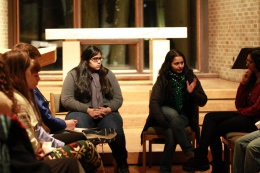
The Interfaith Chaplaincy hosted a discussion about faith and space in the Harlan Chapel on Thursday.
A ceremony originally organized as a dedication of a new Hindu altar last Thursday in the Harlan Chapel became a discussion on faith and space sponsored by the Interfaith Chaplaincy after some concerns were raised by Protestant members of the Brandeis University community regarding sharing the space.
Students, administrators and members of the Chaplaincy attended the discussion. In an interview with the Justice, Rev. Matt Carriker, the Protestant chaplain, said that some students had voiced concerns after an email to the community about the impending Hindu services, and that after a meeting last Monday with both Christian and Hindu members of the community, it was decided to have a discussion about Hinduism to further explore the issue.
Sharada Sanduga ’14, president of Namaskar—a group established to promote Hindu, Jain and Sikh culture and spiritual heritage— began the discussion with a brief explanation of how Hindu students could share the space. According to her, participants in Hindu services would “keep deities in the back room [of the chapel], bring them out for services, and put them back at the end.”
However, after a meeting last Monday including the Protestant and Catholic chaplains, the Hindu adviser, a few students and one professor who had raised concerns about space in general, how space could potentially be shared and the legality of sharing the space due to the donor’s intent for the chapel, they concluded that “it would be better to have discussion about the ceremony and sharing space and how space functions on campus in terms of religious ceremonies and religious practice,” Sanduga said in an interview with the Justice.
Camille Reynolds (M.A.) and Prof. Judith Dean (IBS) both expressed concerns about the potential of sharing the Protestant chapel.
Sanduga noted, however, that “we clearly understand and we completely respect” the concerns.
According to Reynolds, she and Dean were concerned when they first received the invitation to the Hindu ceremony because there had been no discussion within the Protestant or Christian community about utilizing the space for the ceremony. “We just saw it about a week or two before the actual ceremony was announced, so we were also concerned that the Protestant Christian community in some respects were never notified about this change,” Reynolds said in an interview with the Justice.
Carriker said in an interview with the Justice that he believes some of the rationale for making this discussion about faith and space rather than the establishment of the Hindu altar was because originally the chapel was built as a space for Protestants. Carriker said Northeastern University is an example of a university with a multi-faith sacred space, which all religions share.
Reynolds confirmed the sentiment that had the chapel been built as a multi-faith worship space, there would be no issue. “If that’s true and all the groups know that it’s for common use and it has to be shared, I think there’s no expectation when you open the door that it’s going to be one thing or the other, we all recognize we need to share it. So that would have been a very different situation,” she said.
According to Carriker, combining the Catholic and Protestant chapels to make Harlan multi-faith has come up as a potential resolution, in addition to finding another space for the Hindu community to worship on campus. Although Reynolds and Dean said they would accept this compromise, they questioned the legality of changing the function of the Protestant chapel due to the donor’s intentions and wishes for the building.
Carriker wrote in an email to the Justice that, at the moment, the Chaplaincy is investigating the contract and donor agreement.
Vaishali Gupta, the Hindu adviser, acknowledged during the course of the discussion that problems could arise from having Hindu services in “a space built for Christian worship” due to the inherent differences between monotheistic Christianity and polytheistic Hinduism.
Dean explained in an interview with the Justice that, ideally, the ceremony that Gupta wanted to perform is “an establishment of the permanent presence of the gods and goddesses for people to come and worship.
“So she was not, as I understood her, … particularly happy with having to redo her ceremony in other places, because the whole point of the ceremony, even in [its] Hindu name, is establishment,” Dean continued.
Carriker told those in attendance that it is “always a tough question when talking about sharing space” and that this “can prompt tension in interfaith dialogues.” Initially, Carriker was in favor of sharing the space with Hindu students.
“Personally, from my own faith, I’m fine with it being in this space, but that’s kind of the tough part about interfaith dialogue, is that, even within Christianity there’s many widely different beliefs,” Carriker said in an interview with the Justice.
Coordinator of the Interfaith Chaplaincy Rev. Walter Cuenin elaborated on the nature of the conflict. “The issue is sharing with a religion that some people believe is incorrect,” Cuenin told the audience. He stated that the Hindu faith “is different, and most don’t know much about it. It scares some people.
”Toward the end of the discussion, David Elwell, director of the International Students and Scholars Office, acknowledged the difficulties of finding an available space for Hindu worship, but expressed his belief that the University needs “other spaces to be able to have events for people of all faiths to learn.”
According to Gupta, this was a productive means of discussion, as learning about others who have differing opinions “gives one an opportunity to go deeper into [his or her] own thinking.”





